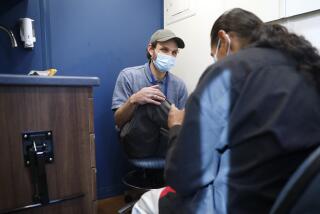When a company reported that it discovered the virus that causes non-A, non-B hepatitis, science and Wall Street collided. Academic researchers note the finding hasn’t been validated in medical journals; Chiron Corp. says it owes disclosure to shareholders. : A Test of Blood and Money
- Share via
Chiron Corp., which was the brains behind the first human vaccine produced through genetic engineering, has impressed scientists for several years. But since opening in 1981, the small Emeryville, Calif.-based biotechnology company hasn’t earned a penny.
That, many analysts say, appears likely to change within a few years as a result of a possible scientific breakthrough announced by the concern last week.
Chiron disclosed at a Washington news conference that it has identified the virus causing the most common form of blood-borne hepatitis, a potentially dangerous liver disease called “non-A, non-B hepatitis.”
The company said it was developing a blood screening test that could prevent tens of thousands of Americans a year from being infected with the virus through transfusions. Further, Chiron said, its discovery would aid research toward developing a vaccine against the disease.
Not everyone was dazzled by the announcement. Some scientists cautiously noted that Chiron’s findings hadn’t been published in a medical journal or presented at a medical meeting and subjected to peer review. Nor has the company grown the virus in the lab or infected animals with it, a standard method of proving that a microorganism causes a disease. The blood test also has yet to be submitted to the Food and Drug Administration for approval.
All the same, securities analysts who monitor the fledging biotechnology industry were enthusiastic.
“It is a major coup for Chiron,” said Denise Gilbert of Montgomery Securities.
Gilbert said a diagnostic kit for screening blood for non-A, non-B hepatitis could bring the company and its partner, Ortho Diagnostic Systems, $80 million to $100 million in annual domestic sales. Chiron projects worldwide sales of $200 million.
“There doesn’t appear to be anybody nearly as close to a vaccine as well as a diagnostic kit,” added M. Kathleen Behrens, an analyst with Robertson Colman & Stephens in San Francisco. “This is important in terms of lead time and patents.”
Behrens said she expects the company to have a blood test kit by around the third quarter of next year. A vaccine is further away--perhaps three to five years--but would be worth $100 million to $150 million in annual revenue, she said.
Like many young biotechnology companies developing new products, Chiron has steadily lost money. It reported a loss of $7.2 million on revenue of $13.9 million for the nine months ended Jan. 31. But Gilbert said that if the blood test kit reaches the market in late 1989, the company should halve its losses in 1990 and turn its first profit in 1991. A company spokesman was cautious about the prospects for a profit in 1991, noting that the FDA has yet to approve the kit.
Reaction among investors to Chiron’s announcement was restrained. The stock gained $1.75 a share last Tuesday, the day of the announcement, closing at $16.50. On Monday, it closed at the same price.
“I don’t think the market has factored in all of this yet,” Gilbert said.
Chiron, which went public in 1983, has genetically engineered vaccines, therapeutic hormones and growth factors, which speed the repair of living tissue for healing burns and other skin wounds. The company is working on vaccines for, among other things, Herpes Simplex I and II, malaria and AIDS.
Last fall, it received a $1.55-million grant from the state of California to speed the development of an AIDS vaccine.
In addition, a Chiron subsidiary had begun clinical trials of a growth factor for treating cornea injuries. But because of reports from some patients of eye pain following use of the formula, Chiron has suspended further trials and is studying various other formulations for a treatment that company officials believe eventually will be used widely for healing various kinds of wounds.
Wanted Practical Work
Chiron was founded by a pair of scientists from the San Francisco Bay area. William J. Rutter, 59, chairman of Chiron, also was chairman of the department of biochemistry and biophysics at the University of California, San Francisco, from 1969 to 1982, and he remains on the university’s faculty.
Chiron’s co-founder was Edward E. Penhoet, a longtime professor of biochemistry at the University of California, Berkeley. Penhoet, 47, is now company president and chief executive.
Chiron was formed “basically because we had a very serious interest in doing something practical with biology,” Penhoet said in an interview. Rutter’s laboratory at the time was working on a hepatitis B project “that we wanted to develop in a more aggressive way than was possible in the academic setting,” Penhoet said.
The company took a major step forward in the summer of 1986 when the FDA approved its Hepatitis B vaccine. The vaccine was made by combining brewers’ yeast cells with the gene of the outer coat of the hepatitis B virus. Chiron licensed Merck & Co. to market the vaccine under the name Recombivax HB.
To market other products, Chiron has formed joint ventures with such companies as Ciba-Geigy, Johnson & Johnson and Ethicon.
The new developments involving the non-A, non-B hepatitis is the result of five years of work. Unlike hepatitis A or hepatitis B, the cause of non-A, non-B hepatitis is not known. People receiving transfusions who contract the disease can develop severe fatigue, nausea and jaundice.
Considered Reliable
Years later, the illness may result in cirrhosis, a life-threatening scarring of the liver.
Although the timing of Chiron’s announcement concerning its non-A, non-B hepatitis findings may have seemed unorthodox to the scientific community, the company’s track record--including several findings that passed muster under peer review--inspires confidence, said Randy Schekman, a UC Berkeley biochemist and Chiron consultant. “I know the people who are there and they are very reliable. It is an enthusiastic crew of young Ph.D.s that is very interested in basic research,” he said.
Penhoet said the company did not submit its results to a scientific journal upon making its initial breakthrough a year ago because there were “a lot of different experiments yet to be completed.” He said Chiron currently is preparing a manuscript for publication in a journal.
Chiron went ahead with its announcement last week, Penhoet said, because of concerns about Securities and Exchange Commission regulations requiring timely disclosure of important corporate news. Disclosure was especially important, he said, because Chiron will be working on the project with several other parties, including government health agencies.
“Under those circumstances, we can’t keep confidentiality,” he said.
More to Read
Inside the business of entertainment
The Wide Shot brings you news, analysis and insights on everything from streaming wars to production — and what it all means for the future.
You may occasionally receive promotional content from the Los Angeles Times.










